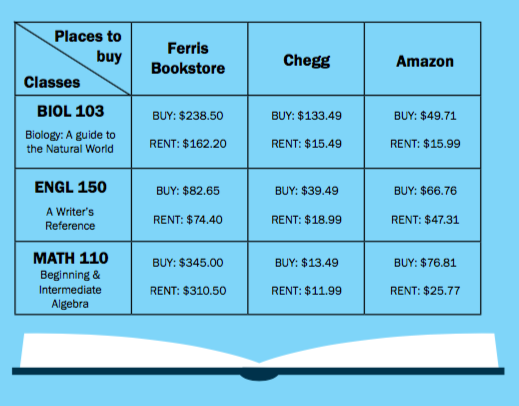
Buying textbooks can be one of the biggest ways to waste money any college student falls for, but why are they so expensive?
It’s because of a concept called supply and demand. Students do not always know if they have any other options, which means those students pay top dollar at college bookstores for textbooks they could get somewhere else for a lot less.
Luckily, Ferris’ bookstore is not the worst offender of over pricing. Often their prices are comparable to those of online bookstores.
It also helps when most of the professors at Ferris understand that college books are expensive and a lot of them try to find a cheaper option for their students, if they can. Professors also will generally email students ahead of time if their book is needed for the first day, otherwise, it’s better to wait until the first day of class to buy a textbook.
Students can still have more luck getting books cheaper elsewhere. The easiest way is to find the ISBN for the textbook and copy it into Google. When going through Google, it’s a lot easier to find risky websites, so be very careful when choosing.
Another option is to go directly to Amazon or Chegg and put the ISBN or title into their search bar. With this option, students can use websites they know they can trust, but they may not be getting the cheapest price. When it comes to book shopping, students need to be aware that they can find cheaper options on many other websites and should do their research before buying.
Another way to save money is to rent a textbook in- stead of buying it. When someone rents a textbook, they can choose to buy it later if they decide they want to keep it.
“I rent books that aren’t in my major. For the rest I keep them,” Ferris nursing senior Dallas Gibson said.
Buying specific books for someone’s major can be a big lifesaver in the future when a student is actually working in their program. Renting can be a great option as it’s a lot cheaper than buying, but if the student needs the book later, it can be a bit of a problem. When deciding between the two, consider if it is needed later in college life, or even in professional life.
Another big consideration to make when buying textbooks is if digital or physical is a better option. Digital can be less expensive, but many people prefer a hard copy of their book. The decision is mainly about a person understanding their learning style.
“I haven’t tried digital yet, but I’ve run into circumstances where it’d be much preferable because carrying everything in my backpack really messes with my back problems,” Ferris television and digital media production sophomore Lilly Franklin said.
However, Franklin said her preference between physical and digital textbooks all lies within the price.
“I would rather break my back instead of paying an extra $30 – $50 plus dollars [with a digital copy].”
Knowing personal limitations, whether physical or monetary, is a really important step in college, especially when it comes to carrying books versus a laptop.
It is also important to determine which edition of the textbook you are looking to buy.
“Buy the previous edition because it usually has the same information. It just may be in a different order then the newest edition. Buying it this way makes it cheaper by quite a bit,” Ferris television and digital media production junior Dean Zahm said.
When it comes to whether the later edition has the right information, students can always talk to the professor about it or even look up reviews on the same book. Some websites, like Amazon, will let students read part of the book ahead of time to see if it has the right information. A lot of the decision-making process when it comes to textbooks is mainly about communication. Professors are generally here to help and know what they are teaching, so if there is any doubt, talk to them.
